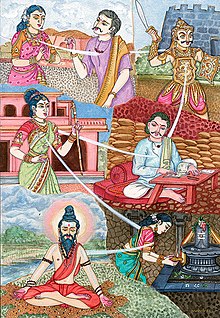The first notable story was "Retelling the Ramayana" (with the link here.) It was a retelling of a classic Indian myth about a princess named Sita who defeated a fearsome enemy named Ravana. I did not have previous knowledge about this topic, so it was interesting to see it presented in a modern, easily readable dialogue format. The introduction offered the question "what if..." which is always an irresistible pull into a story. The story had descriptive and beautiful pictures to embellish the story, and the bar at the top made it very easy to navigate the pages.
The next story book which I enjoyed was "The Good Place: Karma" (which can be seen here.) It took another classic Indian tale and translated it into the modern story of a TV show called "The Good Place" which is also about heaven and hell. Though I knew the TV show (and enjoy it immensely,) I was not familiar with the lore and this served as an excellent introduction. The author goes deeply in depth with explanations about their choices both from the show and from the folklore; I did not actually enjoy this feature and will likely not use it in my writings. Nonetheless, they also very effectively employed images to enhance the reading experience.
The final story I have selected is "Voldemort's Reincarnation" (which you can view here.) It once again took an ancient story and put it in a modern context, utilizing Harry Potter to illustrate the balances of dharma and reincarnation. I was unfamiliar with this concept too but now am very interested to learn more about it. The title was just vague enough that I had to click on it to see what the story was about, which could be considered both a positive and a negative. I have also come to realize that I will very likely use this form of putting folklore into a modern media to tell the story, as I definitely prefer to read those adaptations and would probably enjoy writing them too. The use of pictures was a little bit lacking and disjointed in this story, but it was a good work nonetheless.
 |
| Reincarnation, as noted in most of the readings. Via Wiki Images |
No comments:
Post a Comment